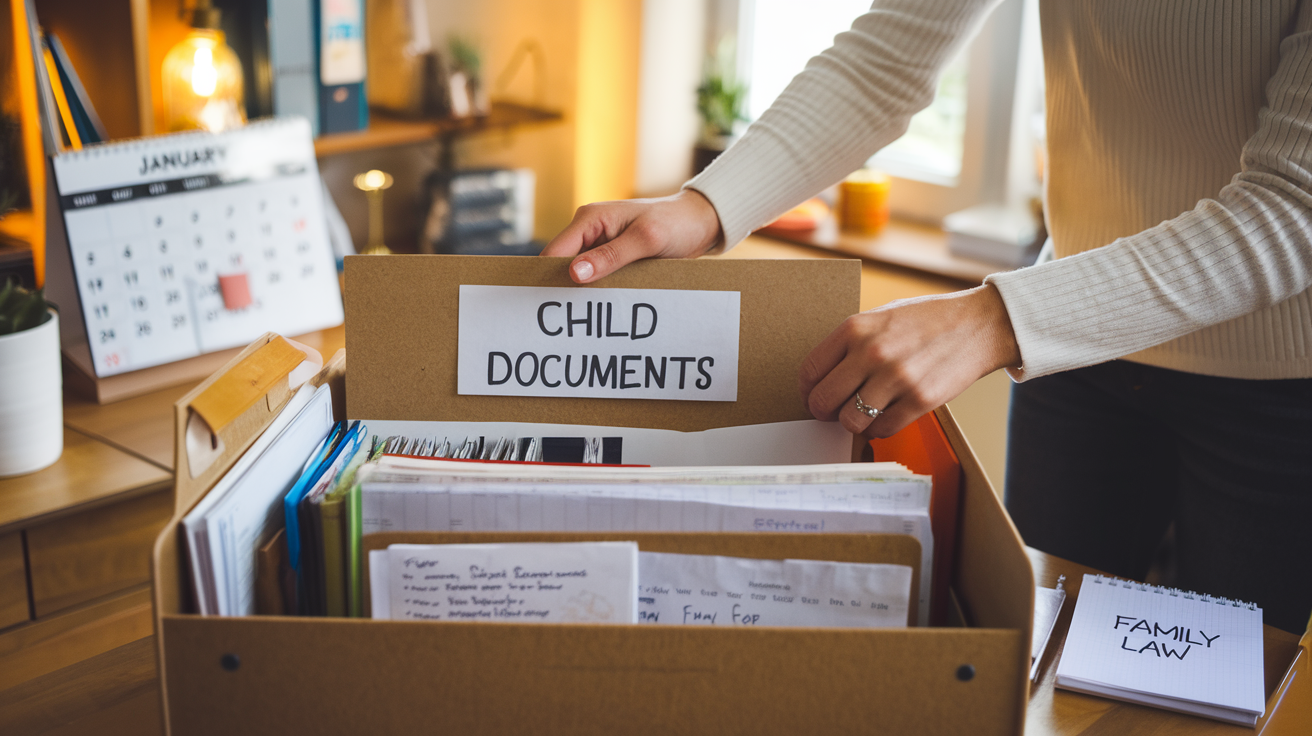
Get Organized Month! What to have prepared for your family law attorney
January is Get Organized Month, and there’s no better time to get your ducks in a row regarding family law matters. Being prepared can make all the difference if you’re facing a divorce, custody battle, or other family-related legal issues. But where do you start? What documents should you gather? How can you ensure you’re not missing any crucial information?
Don’t worry – we’ve got you covered! In this blog post, we’ll walk you through everything you need to have prepared for your family law attorney. From creating a comprehensive case file to documenting child-related matters, we’ll show you how to streamline the process and safeguard sensitive information. You’ll feel confident and ready to tackle your legal challenges head-on when you’re done reading. Let’s dive into the seven key areas you must focus on to get organized and set yourself up for success in your family law case.
Understanding Family Law Documentation

Essential legal documents
When preparing for a family law case, it’s crucial to have all essential legal documents in order. These may include marriage certificates, divorce papers from previous marriages, prenuptial or postnuptial agreements, and any existing court orders related to your family situation. Gather and organize these documents chronologically, making copies for your records and attorney.
Financial records
Financial documentation plays a pivotal role in family law cases. Collect recent pay stubs, tax returns for the past three to five years, bank statements, investment portfolios, and retirement account information. Don’t forget to include records of debts, mortgages, or loans. Organizing these financial documents will help your attorney accurately assess your financial situation and effectively advocate for your interests.
Personal identification
Ensure you have readily available personal identification documents such as your driver’s license, passport, social security card, and birth certificate. These documents are essential for verifying your identity and may be required for various legal proceedings. Please keep them in a secure, easily accessible location.
Family-related paperwork
Gather all relevant family-related paperwork, including birth certificates for children, adoption papers, and custody agreements if applicable. If there are any medical records pertinent to your case, such as those related to children’s health or spousal support claims, include these as well. Having these documents organized and readily available will streamline the legal process and help your attorney build a stronger case on your behalf.
Creating a Comprehensive Case File

Organizing documents by category
Organize your documents into clear categories when creating a comprehensive case file for your family law matter. This approach will help you and your attorney quickly locate important information. Common categories might include financial records, correspondence, legal documents, and child-related information. Use labeled folders or digital directories to keep each category separate and easily identifiable.
Developing a chronological timeline
A chronological timeline is crucial for presenting a clear picture of your case. List significant events related to your family law matter, including separation dates, major financial transactions, and essential interactions. This timeline will help your attorney understand the sequence of events and identify key turning points in your case. Be sure to include supporting documentation for each event listed.
Digitizing important papers
In today’s digital age, electronic copies of important documents are essential. Scan physical papers and save them in a secure, cloud-based storage system or encrypted hard drive. This protects your documents from loss or damage and allows for easy sharing with your attorney. Organize digital files using the same category system as your physical documents for consistency.
By following these steps, you’ll create a well-organized case file that will streamline your communication with your family law attorney and potentially save you time and money in the legal process. Remember to update your file as new information becomes available, and always maintain the confidentiality of sensitive documents.
Gathering Evidence for Your Case

Gathering Evidence for Your Case
Now that you’ve organized your basic documentation, it’s time to focus on gathering evidence to support your case. This step is crucial in family law matters, as it can significantly impact the outcome of your case.
A. Photographs and videos
Visual evidence can be robust in family law cases. Collect relevant photographs and videos that support your claims. This might include images of property, living conditions, or interactions with children. Ensure all media is dated and properly labeled for easy reference.
B. Correspondence (emails, texts, letters)
Written communication can provide valuable insights into your case. Save and organize all relevant emails, text messages, and letters. This includes correspondence with your spouse, discussing children, or any agreements made. Create digital backups and organize them chronologically or by topic.
C. Witness statements
Identify potential witnesses who can provide testimony to support your case. This could include family members, friends, neighbors, or professionals like teachers or therapists. Obtain written statements from these individuals, ensuring they are dated and signed.
D. Police reports or incident records
If applicable to your case, gather any police reports or incident records. These official documents can provide crucial evidence, especially in cases involving domestic violence or child safety concerns. Request copies from the relevant authorities and keep them in a secure location.
With your evidence organized, you’ll be better prepared to present a strong case. Next, we’ll delve into preparing your financial information, another critical aspect of family law cases.
Preparing Financial Information

Income statements and tax returns
Income statements and tax returns are crucial when preparing financial information for your family law case. Gather your pay stubs, W-2 forms, and tax returns for three to five years. These documents provide a clear picture of your financial status and earning capacity, essential for matters like spousal support or child support calculations.
Asset and liability lists
Create a comprehensive list of all assets and liabilities, both individual and joint. This should include real estate, vehicles, investments, retirement accounts, and valuable personal property. Don’t forget to list debts such as mortgages, car loans, credit card balances, and personal loans. Be thorough and accurate, as this information will be critical in property division negotiations.
Expense reports
Compile detailed expense reports showing your monthly living costs. Include housing, utilities, food, transportation, healthcare, and other regular expenses. This information helps demonstrate your financial needs and lifestyle, which can be particularly important in alimony or child support cases.
Business financial documents
If you own a business or are self-employed, gather relevant financial documents such as profit and loss statements, balance sheets, and business tax returns. These records are crucial for accurately assessing your income and the value of your business assets, which can significantly impact financial settlements in family law cases.
With this comprehensive financial information prepared, you’ll be well-equipped to discuss your case with your family law attorney. Next, we’ll explore the importance of documenting child-related matters, equally crucial in many family law proceedings.
Documenting Child-Related Matters

Custody schedules
When documenting child-related matters, custody schedules are a crucial element. Create a detailed calendar outlining the current arrangements, including regular weekday and weekend schedules and special occasions like holidays and school breaks. Be sure to note any agreed-upon pick-up and drop-off times and locations. This comprehensive schedule will help your family law attorney understand the existing custody situation and identify areas for potential negotiation or improvement.
School and medical records
Gather all relevant school and medical records for your children. This includes report cards, standardized test scores, individualized education plans (IEPs), and correspondence with teachers or school administrators. For medical records, compile vaccination histories, records of significant illnesses or injuries, and any ongoing treatment plans. These documents provide valuable insight into your children’s well-being and can be crucial in custody discussions.
Extracurricular activities
Document your children’s involvement in extracurricular activities, such as sports teams, music lessons, or clubs. Include schedules, costs, and any notable achievements. This information demonstrates your children’s routines and interests, which can be important factors in custody decisions. It also helps your attorney argue for maintaining stability in your children’s lives.
Child support calculations
Prepare detailed information for child support calculations, including both parents’ incomes, health insurance costs for the children, and any childcare expenses. Document any special needs or extraordinary expenses related to the children. This financial information is essential for determining fair and appropriate child support arrangements.
Streamlining Communication with Your Attorney

Creating a contact list
Start by compiling a comprehensive contact list of all individuals relevant to your family law case. This should include your immediate family members and extended relatives, friends, neighbors, or colleagues who may serve as witnesses or provide supporting statements. Include their full names, phone numbers, email addresses, and a brief note about their relationship to you or relevance to the case. This organized list will help your attorney quickly reach out to key individuals when needed, saving valuable time during the legal process.
Summarizing key events
Develop a chronological summary of significant events related to your family law case. This timeline should be concise yet detailed, highlighting important dates, incidents, and turning points in your relationship or family situation. Include relevant information such as separation dates, major conflicts, or instances of misconduct. Be sure to note any police reports, medical records, or other documentation associated with these events. This summary will give your attorney a clear overview of your case’s history, enabling them to identify crucial points and develop a strong legal strategy.
Preparing questions for consultation
Before meeting with your family law attorney, create a list of questions to address during your consultation. Focus on queries that clarify legal procedures, potential outcomes, and your rights and responsibilities. Consider asking about custody arrangements, property division, spousal support, or any specific concerns unique to your situation. Prioritize your questions to ensure you cover the most critical issues within the allotted time. By preparing these questions in advance, you’ll make the most of your attorney’s expertise and better understand your case’s trajectory.
Safeguarding Sensitive Information

Secure storage solutions
When dealing with sensitive family law documents, it’s crucial to implement robust storage solutions. Consider investing in a fireproof and waterproof safe for physical documents. For digital files, use encrypted cloud storage services like Boxcryptor or Tresorit, which offer end-to-end encryption. These measures protect your sensitive information from unauthorized access or physical damage.
Backing up digital files
To prevent data loss, backing up your digital files regularly is essential. To this end, you should utilize both local and cloud-based backup solutions. Set up automatic backups on your devices and use cloud storage services like Google Drive or Dropbox. Remember to encrypt sensitive files before uploading them to cloud services. This dual approach ensures you have multiple copies of your important documents, reducing the risk of losing critical information.
Controlling access to documents
Implement strong passwords and two-factor authentication for digital files to limit access to your sensitive family law documents. Keep physical documents in a locked cabinet or safe and maintain a log of who accesses them. When sharing documents with your attorney, use secure file-sharing platforms with encryption and access controls. By carefully managing who can view and edit your documents, you minimize the risk of information falling into the wrong hands.
Now that you’ve learned how to safeguard sensitive information, let’s explore how to effectively streamline communication with your attorney to ensure a smooth legal process.

As you embark on your family law journey, organizing is key to a smoother process and potentially better outcomes. By meticulously preparing your documentation, creating a comprehensive case file, and gathering relevant evidence, you’re setting a strong foundation for your case. Don’t forget to pay special attention to financial information and child-related matters, as these are often crucial aspects of family law proceedings.
Remember, effective communication with your attorney is paramount. By streamlining your interactions and safeguarding sensitive information, you’re protecting yourself and ensuring that your legal representation can work more efficiently on your behalf. During Get Organized Month, take the time to implement these practices. Your future self will thank you for your foresight and preparation, potentially saving you time, stress, and even legal fees in the long run.
Encinitas residents looking for practical and compassionate legal help in family law and divorce matters turn to Lass Law for results. From military divorce and prenuptial agreements to cases involving domestic violence, their team works to protect your rights and your future. The firm also promotes peaceful solutions through divorce mediation. To schedule a consultation, visit the contact page.










